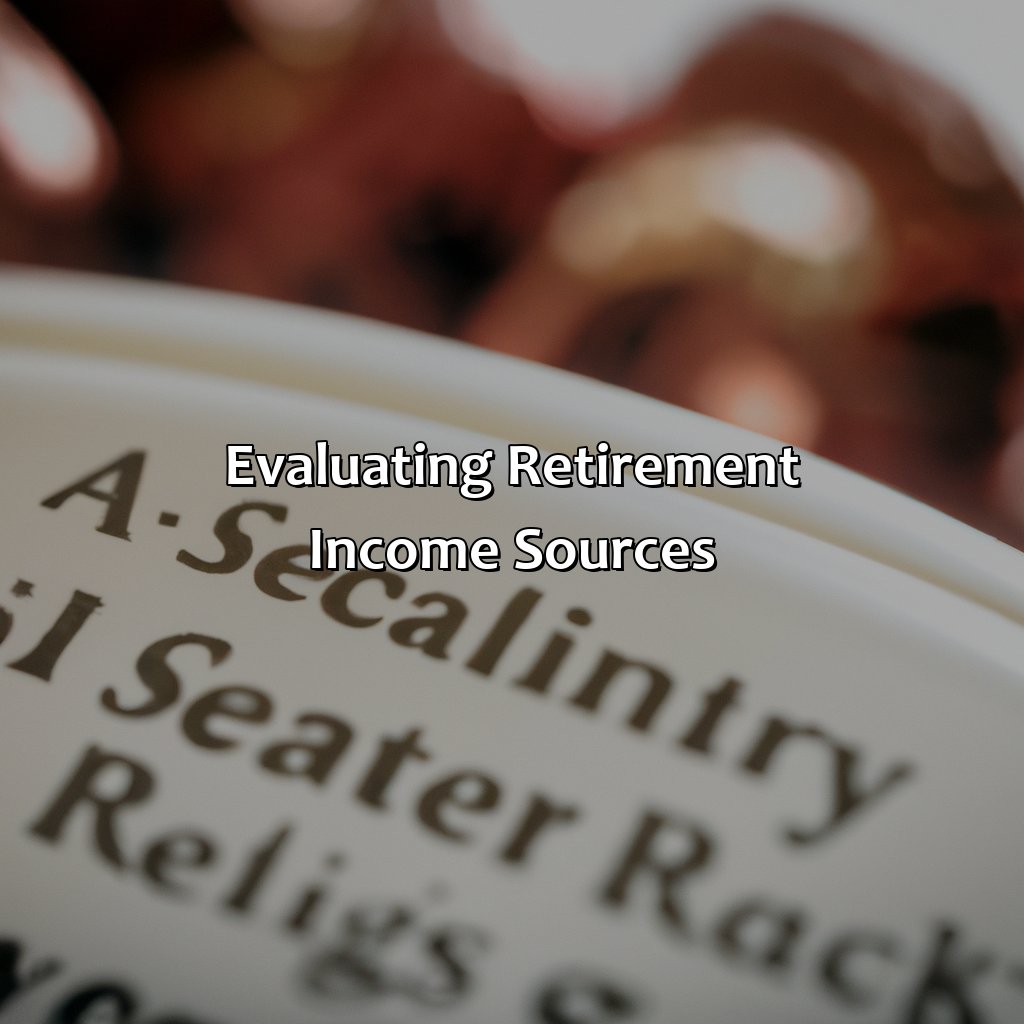How Much Money Should You Have In Retirement?
Key Takeaway:
- It is important to determine your financial needs in retirement in order to estimate your retirement expenses and prepare for retirement savings. This includes calculating retirement savings needs, choosing retirement savings plans, and increasing retirement contributions.
- Retirement expenses can be broken down into basic living expenses, healthcare expenses, and leisure expenses. These should be taken into account when estimating retirement expenses.
- Evaluating retirement income sources such as Social Security income, pension plans, and annuities can provide additional financial security during retirement. It is important to reassess retirement expenses, rebalance investments, and delay retirement if necessary to adjust retirement plans as needed.
You are concerned about your future and the financial security of your retirement. Have you ever wondered how much money you need to have saved by the time you retire? Read on to learn the answer and discover the key steps to achieving financial security.
Determining Financial Needs in Retirement
Determining the financial requirements for retirement can be a daunting task. It involves analyzing the necessary expenses, living standards, and expected life span to determine how much money an individual needs to maintain their desired lifestyle. To achieve this, a thorough understanding of current and future personal finances, including savings, assets, debts, and insurance policies, is necessary.
Knowing one’s expenses and living standards is the first step in estimating retirement needs. Estimating monthly expenses including housing, utilities, healthcare, food, and transportation is pivotal. Additionally, an individual must also take into consideration their desired quality of life, travel expenses, and other retirement goals. After evaluating these expenses, an individual must consider external factors like inflation and the fluctuating economy, which can affect retirement savings. It is important to revisit and reassess retirement goals and needs regularly.
Moreover, it is crucial to understand how much return can be generated from investments towards retirement savings. Factors like risk tolerance, investment time horizon, and the investment portfolio can influence the return trend and retirement savings growth. It is a good practice to seek advice from financial experts to make informed investment decisions.
A personal anecdote illustrates how unpredictable life events can impact retirement needs. Retiree John had planned his retirement savings considering his expenses and living standards. However, unforeseen medical expenses arising from a chronic condition drained his savings quickly. John wished he had factored these costs into his retirement planning from the start, which serves as a reminder that a robust retirement plan should account for unexpected expenses.
Retirement planning should be done with care and precision, taking into account an individual’s personal circumstances and goals. Determining financial needs for retirement is a critical step towards ensuring a peaceful and enjoyable retirement.

Image credits: retiregenz.com by Yuval Arnold
Estimating Retirement Expenses
Figuring retirement costs properly? We can help! In our “Estimating Retirement Expenses” section, you’ll learn how to budget the necessary money. There are three parts to consider for efficient estimating:
- Basic Living Expenses
- Healthcare Expenses
- Leisure Expenses
Get calculating!

Image credits: retiregenz.com by Adam Woodhock
Basic Living Expenses
Living costs during retirement are a critical aspect of financial planning. These expenses entail essentials such as food, housing, transportation, healthcare, utilities and insurance premiums. Plan according to your living standards and factors like family size, location and existing debts.
I guess it’s true what they say – growing old isn’t for sissies. That’s especially true when you see the estimated cost of healthcare expenses in retirement.
Healthcare Expenses
When estimating retirement expenses, healthcare costs are an essential factor that cannot be ignored. As one ages, the probability of developing health problems increases, leading to higher healthcare expenses. These costs may include medical procedures, hospital stays, and prescription drugs.
It’s crucial to note that healthcare inflation has grown much faster than general inflation rates over the years, making it challenging to estimate these costs accurately. According to a recent study by Fidelity Investments, the average couple retiring at age 65 will need $300,000 in today’s dollars for medical expenses throughout retirement.
To prepare for healthcare expenses in retirement, one can consider purchasing long term care insurance or contributing towards a Health Savings Account (HSA). It’s also essential to invest in a well-diversified portfolio that can provide steady returns over time.
As medical advancements continue to be made and life expectancy rises globally, it’s necessary to keep oneself financially prepared for any potential health issues in the future. Planning early and regularly reevaluating one’s financial situation can help avoid difficulties later on.
A true story about an elderly couple shows how healthcare costs can affect retirement planning significantly. After enjoying many years of their golden years together with no significant health problems, they were abruptly faced with exorbitant medical billsafter one spouse was diagnosed with a serious illness. This unexpected financial burden led to a major change in their lifestyle and retirement plans.
Retirement: when naps become a regular part of your leisure expenses.
Leisure Expenses
For Your Pleasure:
Leisure expenses are a crucial aspect to consider when estimating retirement expenses. Here are 6 points to keep in mind:
- Travel costs, including transportation and accommodation, should be taken into account for trips both national and international.
- Social activities, such as going to restaurants or attending events, will incur regular costs.
- Club memberships and hobbies will also require funds to upkeep.
- Technology upgrades may become necessary for entertainment purposes.
- Fashion upgrades may also be desired for an active social life as well as personal grooming.
- Cultural experiences such as theatres/museums can be included in such expenses too.
Additionally, remaining socially engaged is equally important during later years of life but often overlooked. Therefore, considering leisure expenses makes sense financially and emotionally.
Don’t let the fear of missing out stop you from envisioning your ideal retirement lifestyle. Plan ahead with leisure expenses in mind to ensure a comfortable and fulfilled retirement.
Start saving now, so you can afford the good kind of dentures when you retire.
Preparing for Retirement Savings
Ready to save for retirement? This article, ‘How Much Money Should You Have in Retirement?’ delves in. It covers calculating needs, choosing plans, and increasing contributions. Get ready to save!

Image credits: retiregenz.com by Harry Arnold
Calculating Retirement Savings Needs
The amount of money you should have in retirement largely depends on individual factors such as lifestyle, expenses, and other financial sources. Assess your current and future expenses, consider inflation rates and estimate life expectancy to determine how much savings you’ll need for different retirement lifestyles.
Planning for retirement isn’t just about saving money, but also about considering the lifestyle you want to lead. Include potential living costs such as healthcare and housing when budgeting and saving for retirement. Determine your social security benefits and compare it with other retirement savings options.
Remember that there is no one-size-fits-all approach when it comes to retirement planning. A friend of mine planned for a simple lifestyle during her retirement but later added fancy vacations due to unexpected extra income; therefore, be open-minded and flexible while planning for your ideal future.
Saving for retirement is like playing a game of limbo, except the pole keeps getting higher and our flexibility keeps getting lower.
Choosing Retirement Savings Plans
Making the Right Choice for Your Retirement Funds
Retirement plans require careful consideration to ensure stability in the future. Understanding the various options available, such as 401(k)s and IRAs, is essential for choosing the right plan that aligns with your financial goals and lifestyle.
When evaluating retirement savings plans, it’s crucial to compare:
- investment limits
- fees
- employer contributions (if any)
- tax implications that can affect your final payout
Additionally, factors like risk tolerance and age should also be considered to determine which options suit you best.
To maximize retirement funds, diversifying investments in different assets classes like stocks, bonds ensures a balanced portfolio to withstand market fluctuation. Allocating assets based on age is another tactic for managing portfolio risks.
Pro Tip: Regularly reviewing and rebalancing portfolios throughout retirement will keep funds aligned with individual objectives and maintain long-term financial security.
Saving for retirement is like investing in a sweater during a heatwave, but increasing your contributions is like buying that AC unit just in case.
Increasing Retirement Contributions
To boost your retirement savings, consider increasing the amount you save annually. Here are five tips to help increase your retirement contributions:
- Adjust your Budget: Reassess your current spending habits and adjust where necessary to ensure extra funds go towards retirement savings.
- Maximize Employer Matching: Ensure that you are contributing enough each year to receive the maximum matching contribution from your employer.
- Contribution Increases: Gradually increase the amount you contribute, either monthly or annually. This will compound over time for significant gains.
- Investment Strategy: Consider investing in funds with higher returns to accelerate your growth rate on invested funds while taking minimal risks.
- Roth Retirement Account Conversion: Convert existing traditional accounts into Roth retirement accounts for tax-free withdrawals during retirement years.
When choosing the right approach for yourself, consider any restrictions or limitations set by employer plans, past account balances, and personal income goals.
It’s essential to take action promptly when planning for our retirements. Great pension options can provide a comfortable life in our golden years. Mary realized this too late. While she always participated in her company’s 401(k) plan, she was never able to make up for lost time after suffering a career setback early on, leaving her retiring with less than ideal pension options and lower overall benefits than if she had taken proactive steps earlier in her career.
Why work when you can just rely on your well-placed bets at the racetrack for retirement income?
Evaluating Retirement Income Sources
Evaluating retirement income sources is key when planning for retirement. Social security income, pension plans, and annuities are all solutions to think about. Knowing the pros and cons of each one can help you decide how much to save. Let’s take a closer look at these three options!

Image credits: retiregenz.com by David Jones
Social Security Income
For retirement planning, Social Security payment is a vital source of income. It is a government-provided benefit that ensures financial security for retirees. The amount of payment is based on factors like the number of years worked and the age at which you retire.
This income source is sustainable and remains steady throughout your retirement period. The eligibility age for Social Security benefits depends on your birth year, but it ranges between 62 and 67 years old. You can also opt to delay receiving payment until 70 years old, which could result in increased monthly payouts.
Interestingly, claiming benefits earlier than full retirement age results in reduced monthly payments. Therefore, it’s crucial to plan ahead for optimal outcomes. Additionally, Social Security payments may be taxable depending on individual circumstances.
Pro Tip: Access your Social Security statement regularly or use online calculators to estimate the amount of payment you can expect in retirement.
Retirement plans are like a box of chocolates – you never know what you’re gonna get, but you’re hoping for the golden ticket of a pension plan.
Pension Plans
Retirement Income from Employer’s Annuity Payouts – Employer’s Annuity is a lifelong Pension Plan. The contributions made by both employee and employer are paid out as monthly or yearly annuities upon retirement. These plans have minimum requirements, such as length of service, to qualify for full benefits. Generally, these provide stable and reliable payouts in retirement.
Furthermore, Employer’s Annuity Payouts are categorized as Defined Benefit Plans and Defined Contribution Plans. Defined Benefit Plans promise a predetermined payout amount after retirement while the contributions of Defined Contribution Plans depend on the earnings of investments in the plan.
Employer-sponsored pension plans were introduced during World War II when companies faced labor shortages. However, it became more popular during the post-war era, where people began dreaming about stable retirements after long-term service at their workplace.
Annuities – because who needs control over their own money in retirement anyways?
Annuities
Investing in a financial product that offers steady income to retirees is a valuable consideration. Fixed annuities are one such type of payment plan where you invest a lump sum amount with an insurance company and receive a fixed rate of return over a specified period, providing guaranteed returns without any market fluctuations. Annuities also offer extended benefits like death benefit options, which help your heirs inherit the remaining balance after your death, making it a worthwhile investment for ensuring long-term financial stability.
It’s important to note that annuities can be expensive investments and often involve complex terms and conditions. Hence, before deciding on buying an annuity, it’s advisable to consult with an expert financial advisor who can assess your situation and provide crucial insights about the various pros and cons associated with this option.
Pro Tip: It’s crucial to review all the terms and conditions before investing in viable retirement options like annuities as part of informed decision-making.
Retirement plans are like GPS systems, if you make a wrong turn, just recalculate and adjust accordingly.
Adjusting Retirement Plan as Needed
Re-assess retirement expenses. Re-balance investments. Delay retirement, if needed. These are the solutions for adjusting your retirement plan. It all depends on your current needs and financial situation.

Image credits: retiregenz.com by Yuval Jones
Re-assessing Retirement Expenses
Adjusting Your Retirement Budget – How to Determine the Right Amount
Retirement costs might increase as you age. It is fundamental to review your budget regularly. Otherwise, you may run out of money in retirement. You should figure out how much essential spending–food, housing, and healthcare–will cost each year.
To calculate how much income you’ll need for the retirement dream you want, it’s essential to examine your budget and assess any retirement dreams or aspirations that you have for yourself. If those targets are realistic based on your current earnings rate and the necessary contribution rates, you can begin saving immediately.
In addition to assessing your essential spending projection early in retirement planning, it’s also imperative to consider discretionary spending like travel or hobbies that may impact the longevity of your income.
For making a precise prediction about your future savings requirements, personalized investment advising from a financial advisor is necessary. Seek advice from your close ones who have gone through this phase before you take any decision.
Recently my Uncle struggled during his retirement as he underestimated his medical bills. He had set aside funds for basic expenses but not enough for unexpected healthcare expenses he incurred during his retired life. So re-evaluate with professional help and adjust your plan accordingly!
Re-balancing your investments is like taking your car in for regular maintenance, except the stakes are higher and you can’t blame your mechanic if you mess it up.
Re-balancing Investments
Maintaining Optimum Distribution of Assets
Investors need to balance their investment portfolio periodically to maintain the desired distribution of assets. This process is known as rebalancing investments. Rebalancing helps to keep the risk parameters under control, avoids overexposure to an asset class or sector, and maintains the desired returns.
To know when exactly an investor should rebalance his portfolio, he should regularly monitor the performance of his assets against his long-term targets. He should do this across various segments – stocks, mutual funds, bonds – depending on his investment portfolio.
Rebalancing also allows investors to have cash for strategic purchases or even for emergencies. For example, if a retiree’s medical expenses increase unexpectedly in a given year, he can simply use excess cash meant for other investments by withdrawing it from the untaxed accounts rather than from taxable ones.
Pro Tip: A broadly diversified stock or bond fund is much simpler than managing many individual holdings and makes rebalancing far more comfortable in case rules change and you need to adjust your strategy.
Delaying Retirement if Necessary.
In case there isn’t enough retirement savings, it’s crucial to evaluate and adjust the possible delay of retiring. By doing this, one may accumulate additional pension funds through their employment. This will lead to a successful retirement even if the working years surpass those of a typical retirement age.
Another option is to find alternative employment opportunities that provide increased earnings which can alternatively be invested in the retirement fund. This move allows for a steady flow of income while increasing the value of pension funds.
It’s necessary to consider every aspect before making a decision on delaying retirement. Conducting research on probable opportunities and consulting with professionals could give valuable insight into managing post-retirement life effectively.
Pro Tip: Delaying Retirement may build more significant earned dividends as additional money can remain in savings accounts longer than shorter working careers would offer.
Some Facts About How Much Money You Should Have in Retirement:
Financial experts recommend having at least 8 to 12 times your annual salary saved for retirement. (Source: NerdWallet)
To retire comfortably, you should aim to replace 70% to 80% of your pre-retirement income. (Source: Fidelity Investments)
Social Security benefits alone may not be enough to sustain your retirement lifestyle. (Source: The Balance)
Delaying retirement and continuing to work can increase your retirement savings and Social Security benefits. (Source: AARP)
Healthcare costs in retirement can be significant and should be factored into your retirement planning. (Source: U.S. News & World Report)
FAQs about How Much Money Should You Have In Retirement?
How much money should you have in retirement?
It is recommended to have at least 10-12 times your current annual income saved up for retirement.
What factors affect how much money I need for retirement?
The factors that affect how much money you need for retirement include your lifestyle, life expectancy, healthcare costs, inflation, and any existing debt.
Can I rely on Social Security for my retirement income?
While Social Security can provide a source of income in retirement, it should not be relied upon as the sole source of income. It is important to have additional savings and investments for retirement.
What is the 4% rule for retirement savings?
The 4% rule states that you can withdraw 4% of your retirement savings each year without running out of money during your lifetime. This rule is based on historical market returns and may not always be accurate.
How can I start saving for retirement?
You can start saving for retirement by contributing to a 401(k) or IRA, setting up automatic contributions, and reducing expenses to increase your savings rate. Consulting with a financial advisor can also help create a retirement plan.
What if I don’t have enough money saved for retirement?
If you don’t have enough money saved for retirement, you may need to continue working, adjust your retirement lifestyle, and consider alternative income sources such as part-time work or rental income.
 Checkout this IRS Loophole
Checkout this IRS Loophole 




